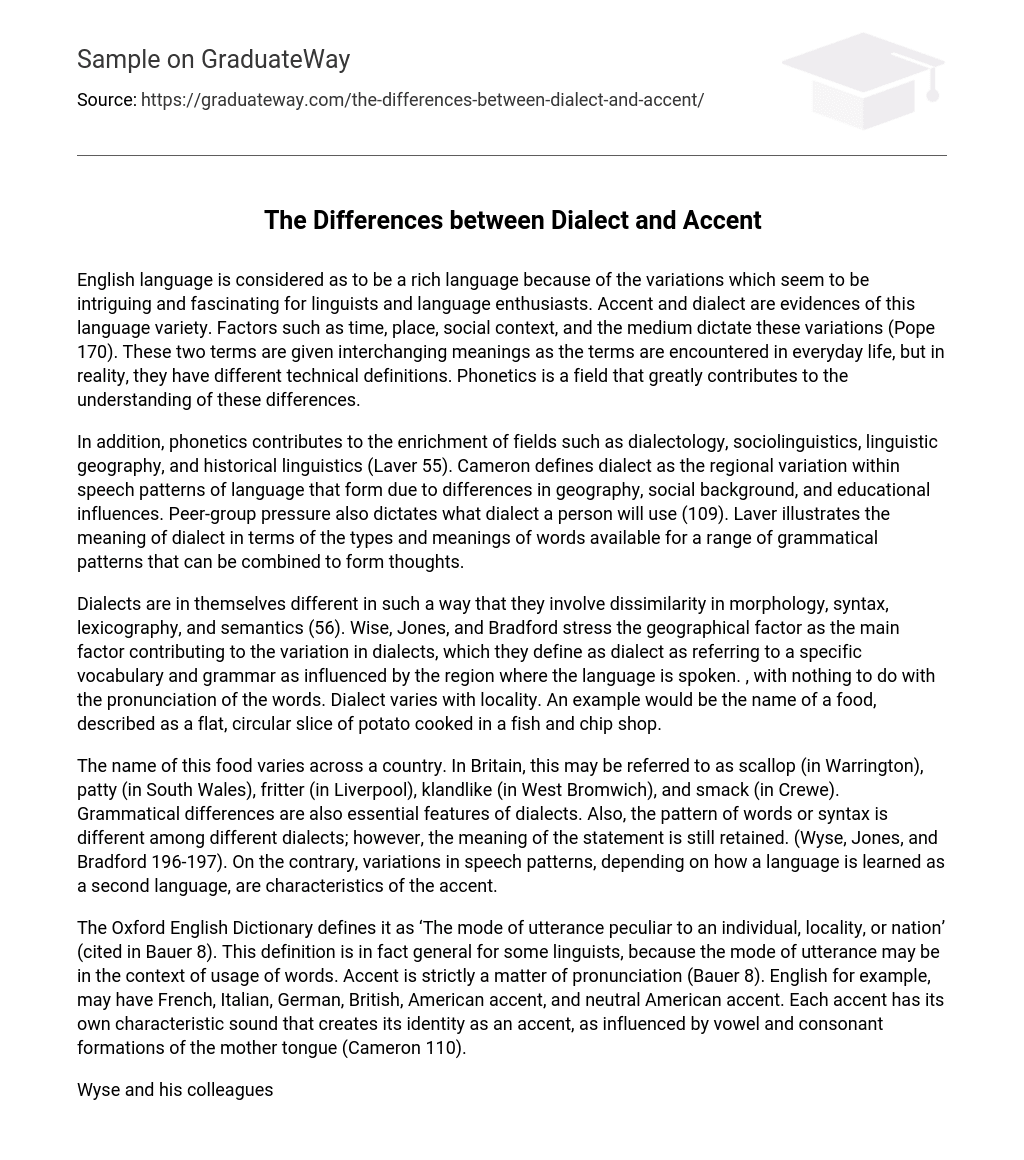English language is considered as to be a rich language because of the variations which seem to be intriguing and fascinating for linguists and language enthusiasts. Accent and dialect are evidences of this language variety. Factors such as time, place, social context, and the medium dictate these variations (Pope 170). These two terms are given interchanging meanings as the terms are encountered in everyday life, but in reality, they have different technical definitions. Phonetics is a field that greatly contributes to the understanding of these differences.
In addition, phonetics contributes to the enrichment of fields such as dialectology, sociolinguistics, linguistic geography, and historical linguistics (Laver 55). Cameron defines dialect as the regional variation within speech patterns of language that form due to differences in geography, social background, and educational influences. Peer-group pressure also dictates what dialect a person will use (109). Laver illustrates the meaning of dialect in terms of the types and meanings of words available for a range of grammatical patterns that can be combined to form thoughts.
Dialects are in themselves different in such a way that they involve dissimilarity in morphology, syntax, lexicography, and semantics (56). Wise, Jones, and Bradford stress the geographical factor as the main factor contributing to the variation in dialects, which they define as dialect as referring to a specific vocabulary and grammar as influenced by the region where the language is spoken. , with nothing to do with the pronunciation of the words. Dialect varies with locality. An example would be the name of a food, described as a flat, circular slice of potato cooked in a fish and chip shop.
The name of this food varies across a country. In Britain, this may be referred to as scallop (in Warrington), patty (in South Wales), fritter (in Liverpool), klandlike (in West Bromwich), and smack (in Crewe). Grammatical differences are also essential features of dialects. Also, the pattern of words or syntax is different among different dialects; however, the meaning of the statement is still retained. (Wyse, Jones, and Bradford 196-197). On the contrary, variations in speech patterns, depending on how a language is learned as a second language, are characteristics of the accent.
The Oxford English Dictionary defines it as ‘The mode of utterance peculiar to an individual, locality, or nation’ (cited in Bauer 8). This definition is in fact general for some linguists, because the mode of utterance may be in the context of usage of words. Accent is strictly a matter of pronunciation (Bauer 8). English for example, may have French, Italian, German, British, American accent, and neutral American accent. Each accent has its own characteristic sound that creates its identity as an accent, as influenced by vowel and consonant formations of the mother tongue (Cameron 110).
Wyse and his colleagues define accent as the way the language is spoken. Accents can also be geographically dependent, with others related to social characteristics. The general description for the term accent would in general be always linked to the way the language is spoken (197). Accent, in simpler terms, refers to pronunciation of words. Everybody uses his or her own accent because everyone who speaks pronounces words (Trudgill 7). In England, when a person is heard of having an accent, that person is considered to use non-standard English.
The Oxford English Dictionary says that accent includes distortion of the pronunciation (mispronunciation of vowels or consonants), or misplacing of stress. Therefore, people ‘with accent’ are considered by linguistically uneducated people as uneducated (Bauer 8). Accent can be classified by either regional or local accent, broad accent, or non-regional accent. It depends on the specificity or the range that an accent is identifiable and associable to the region where it is spoken.
If its identification of a region, a state for example is marked by an accent, it is classified as regional or local accent. Being highly localized, it is also referred to as broad accent. When a certain accent is not that distinctive like a regional accent, a country accent for example (British accent or American accent), that accent is classified as non-regional (Laver 56). Two or more different accents or dialects can be possessed by a single speaker. For example, a Scottish speaker may use Scottish dialect with different accents, or use a different Scottish dialect but retain the same accent.
A native of Kentucky may use Standard English with a regional Kentucky accent for multinationals to have better understanding of that person, or use Kentucky dialect with a more profound Kentucky accent when just talking with some relatives (Laver 57). Trudgill explains that the distinction between dialect and accent in order to demonstrate the possibility of speaking Standard English in terms of the regional accent. Standard English does not concern pronunciation of words. In fact, accent is a much more of an indication of the certain region where a speaker comes from than dialect wherein grammar and vocabulary are observed (7).
In British usage, dialect and accent are two terms treated differently from each other. Grammar and pronunciation are tackled under the term dialect, whereas pronunciation is under the term accent. For the American usage, accent is considered to be just a part of dialect that is a broader field of study (Trask and Stockwell 72). Again, accent is a more distinctive part of language. It is much easier to adapt to a specific accent than to change someone’s dialect. Still, dialect and accent can be adapted by familiarization and practice.
There are people who can speak different accents using a similar dialect, or speak in different dialects but same accent. Both dialect and accent are associated with some certain economic or educational status by some linguistically unsophisticated people. But, this kind of description of dialect and accent are rejected by linguists. Everybody uses both a dialect, and each person has accent. Either standard or not, it is for everyone to appreciate the language that is used to communicate, no matter what accent or dialect it is.





